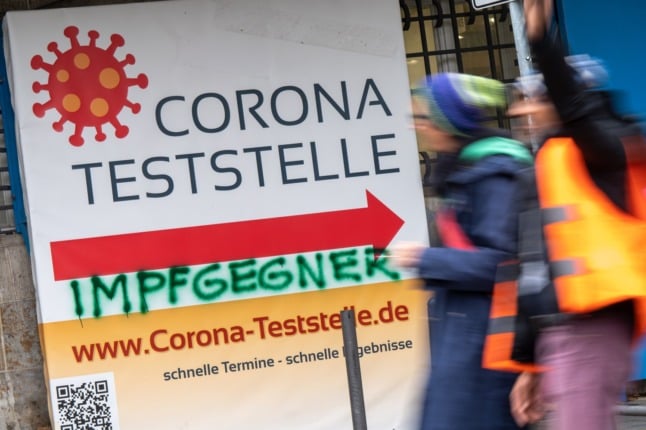What’s happening?
The Robert Koch Institute (RKI) for disease control said Covid cases across Germany are “stagnant”, but that the picture varies between states and age groups.
One group being hit particularly hard is young people. In some parts of Germany, the 7-day incidence among young people is over 500 cases per 100,000 people.
The RKI tweeted on Thursday to say the 7-day incidence of Covid cases among 10 to 19-year-olds is currently more than 500 in eight German districts.
No further details were given on the specific districts, although the darker areas in the map below are where Covid-19 cases are highest in Germany.
The district with the highest incidence in Germany overall is Berchtesgadener Land in Bavaria with 312.2 Covid cases per 100,000 people within seven days.
READ ALSO: Why Covid cases remain high on the German border with Austria
Die 7-Tage-Inzidenz ist derzeit insbesondere bei den 10- bis 19-Jährigen sehr hoch: in 8 Landkreisen liegt sie über 500.
Neuer #COVID19 Wochenbericht, u.a. mit einer Sonderauswertung zu Inzidenzen in verschiedenen Altergruppen➡️ https://t.co/mtCB353YSo pic.twitter.com/2qeNmbzEUX— Robert Koch-Institut (@rki_de) October 14, 2021
Nationwide, however, the 7-day incidence last week in the under-20 age group fell slightly compared to the week before, the RKI said. The figures for people over the age of 20 went up.
The RKI also said there had been 636 school and Kita outbreaks reported in the past four weeks.
Covid-19 vaccines have been approved for children aged 12 and older. But the vaccination rate among 12 to 17-year-olds is still much lower than among adults. Although children and teenagers are much less likely to suffer badly if they get Covid-19 compared to older people, there are still unanswered questions about long-term effects, such as ‘long Covid’.
READ ALSO: German schools and Kitas face higher number of Covid outbreaks
What’s going on across the board?
The RKI said the increase in the 7-day incidence seen in Germany since the beginning of July is not continuing.
“After a slight drop in September, the value is currently stagnating,” said the RKI in its weekly report, adding: “However, the number of cases is significantly higher than in the same period of the previous year.”
Experts warn that they expect a spike in cases in the coming months, despite vaccination rates being possibly higher than first thought.
“For autumn and winter, a renewed increase in the number of cases is to be expected, due to the still large number of unvaccinated people and more indoor contacts”
In Germany’s intensive care units, a plateau in the number of patients with Covid-19 has become apparent in recent weeks, the RKI says. At the moment, almost 1,400 adults with Covid are being treated in ICU. The DIVI Intensive Care Registry states that the proportion of minors affected is 0.7 per cent (as of October 14th).
The number of Covid patients admitted to German hospitals, which is now the most important factor on deciding Covid restrictions, stood at 1.93 patients per 100,000 people within seven days on Thursday.
The German government has not revealed a threshold for when the hospitalisation incidence would be viewed as critical. The previous peak hospitalisation incidence was around 15.5 at Christmas time last year.
Germany on Friday reported 11,518 new infections within 24 hours and 65 deaths. For comparison, a week ago, the figure was 10,429 infections.
The 7-day incidence was 68.7 Covid-19 infections per 100,000 people on Friday. The previous day, it had been 67.0, a week ago 63.8 (previous month: 77.9).
Significant increases were recorded in the German states of Saxony, Thuringia, Saxony-Anhalt, Brandenburg and Saarland in the comparison of the past two weeks, the RKI says.
Vaccination breakthroughs more frequent in old age
In the groups aged 70 and over, for whom the Standing Commission on Vaccination (STIKO) now recommends a booster shot, the incidence increase is slight, according to the RKI report.
It is higher among the very old over the age of 90. The incidence rose from 39 to 48 cases per 100,000 people in seven days in a week. In old age, the immune response after vaccinations is generally lower, and vaccine breakthroughs can more often lead to a severe course, STIKO recently said.



 Please whitelist us to continue reading.
Please whitelist us to continue reading.
Please give your readers the whole story:
1. Number of infections
2. Number of hospitalisations
3. Number of deaths with age, underlying conditions, vaccinated or not.
This might well produce similar statistics to the UK where the hospitalised are mostly unvaccinated younger persons and the deaths are usually associated with deep underlying conditions combined with advanced age.